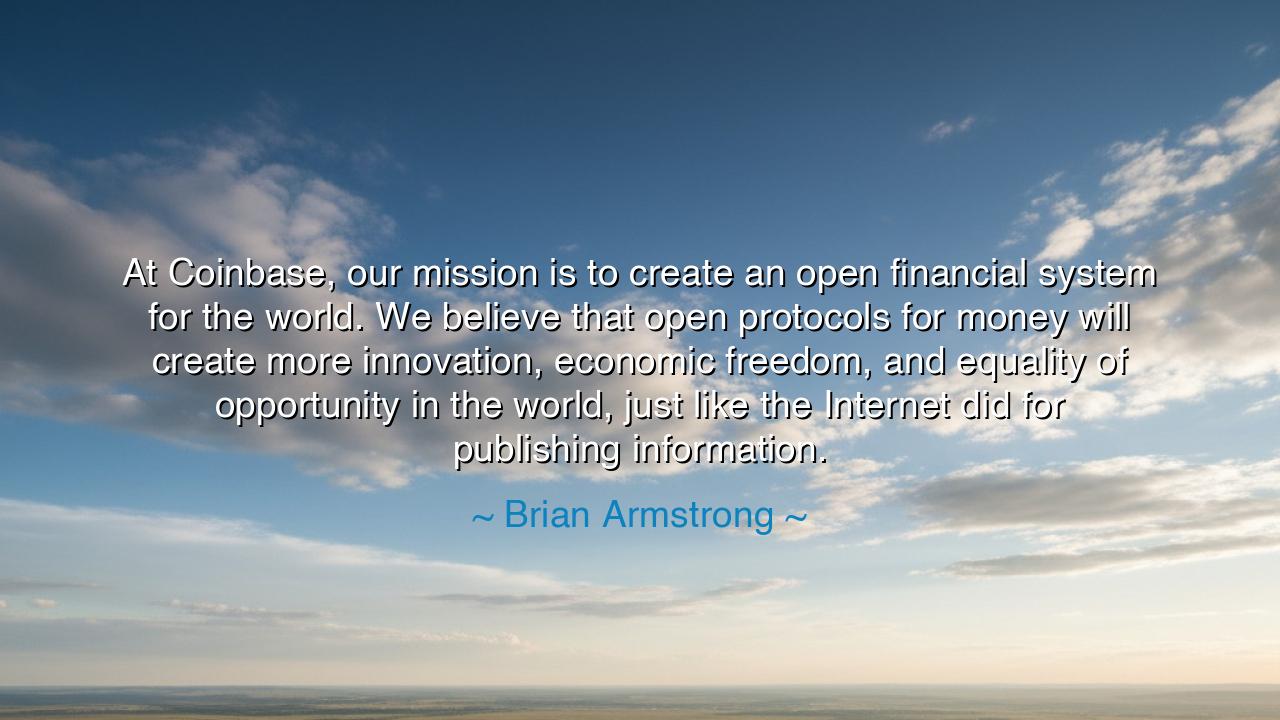
At Coinbase, our mission is to create an open financial system
At Coinbase, our mission is to create an open financial system for the world. We believe that open protocols for money will create more innovation, economic freedom, and equality of opportunity in the world, just like the Internet did for publishing information.






In the words of Brian Armstrong, “At Coinbase, our mission is to create an open financial system for the world. We believe that open protocols for money will create more innovation, economic freedom, and equality of opportunity in the world, just like the Internet did for publishing information.” This is no mere business declaration, but a vision clothed in the language of transformation. It echoes the great dreams of humanity: to cast down barriers, to liberate the flow of knowledge and wealth, and to build systems that empower all, not just the few.
The ancients would have heard in Armstrong’s words the familiar cry of liberation. For what is an open financial system, if not the modern echo of the Agora of Athens or the bustling markets of Babylon—places where men and women gathered, exchanged, and grew together? Yet Armstrong seeks something greater: a marketplace without gates, a treasury without kings, where economic freedom is not the privilege of the powerful but the inheritance of every soul. Just as the Internet broke the chains of silence and allowed every voice to be heard, so too might open protocols break the chains of financial exclusion.
History provides us with proof of this pattern. When Gutenberg’s press gave birth to the printed word for all, knowledge leapt from the hands of scribes and priests into the homes of merchants, craftsmen, and peasants. This unleashed a storm of innovation—reformation, science, and eventually, democracy itself. Armstrong sees in digital money the same force: that if wealth and trade can flow freely through open protocols, then invention will flourish, and new civilizations of thought and enterprise will arise.
Yet he also names the heart of the matter: equality of opportunity. For what good is freedom if it belongs only to the few? In the kingdoms of old, coinage bore the seal of emperors, and wealth was often chained to the will of rulers. In modern times too, millions remain unbanked, their talents shackled by exclusion. Armstrong’s vision challenges this order. He proclaims that technology can break the monopoly of gatekeepers, just as the Internet broke the monopoly of publishers. In this vision, even the poorest farmer with a phone may stand in the same marketplace as the richest merchant, and their voices may weigh equally in the scales of commerce.
But let us not think this path easy. The ancients knew that every promise of freedom is tested by greed, corruption, and fear. Open systems can be exploited, just as closed systems oppress. The building of a new financial order requires not only code and protocols, but also virtue, vigilance, and wisdom. Without these, the dream may falter. Armstrong’s words call not only for technology, but for a reformation of spirit—a world where men and women wield freedom with justice, and opportunity with responsibility.
The lesson for us, then, is clear: embrace the power of openness, but temper it with wisdom. Do not cling to the old walls when the new road is before you, yet do not walk blindly. Recognize that economic freedom is not a gift handed down from above, but a duty to be protected and extended to others. Just as the Internet demanded that people learn, adapt, and guard truth amidst chaos, so too will this new financial world demand discernment and courage.
Practical steps follow. Educate yourself in the tools of the new age, for ignorance is the surest chain. Advocate for fairness, ensuring that technology does not deepen divides but heals them. Support systems of openness, whether in finance, knowledge, or governance, for these are the rivers that water the fields of innovation. And above all, extend opportunity—to the poor, the excluded, the voiceless—for their rise strengthens the whole world.
Thus, Brian Armstrong’s vision stands not merely as a mission for Coinbase, but as a prophecy of what may come: an age where money flows as freely as words, where barriers of class and nation dissolve in the face of shared opportunity, and where innovation, freedom, and equality are not dreams, but the daily bread of humanity. Let us take up this vision as the ancients took up the torch of knowledge—carrying it forward, that the darkness of exclusion may be dispelled, and a brighter world may be born.






AAdministratorAdministrator
Welcome, honored guests. Please leave a comment, we will respond soon